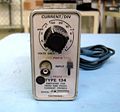134: Difference between revisions
m (added note on early version) |
(add wall wart photo) |
||
| Line 17: | Line 17: | ||
}} | }} | ||
The '''Tektronix 134''' current probe amplifier interfaces a [[P6019]], [[P6020]], [[P6021]] or [[P6022]] current probe to the voltage input of an oscilloscope. It was designed by [[Hans Springer]]. Early versions, up thru S/N 6539, had the switch positions labeled only for the [[P6019]] & [[P6020]] | The '''Tektronix 134''' current probe amplifier interfaces a [[P6019]], [[P6020]], [[P6021]] or [[P6022]] current probe to the voltage input of an oscilloscope. It also had a Volts Only setting of the input attenuator switch that provided a voltage gain of 125 or 50, depending on the position of the probe selector switch. It was designed by [[Hans Springer]]. Early versions, up thru S/N 6539, had the switch positions labeled only for the [[P6019]] & [[P6020]] probes but these early versions are still compatible with the later [[P6021]] & [[P6022]] probes introduced in 1969. | ||
probes but these early versions are still compatible with the later [[P6021]] & [[P6022]] probes introduced in 1969. | |||
Each 134 came with its own separate, dedicated power supply using the same Tektronix proprietary coaxial connector as that used in the Type [[131]]s and its [[015-027 | power supplies ]]. For more information on the power supplies for the Type 134 see the separate Type [[015-0058-01 | 134 Power Supplies ]] page. | Each 134 came with its own separate, dedicated power supply using the same Tektronix proprietary coaxial connector as that used in the Type [[131]]s and its [[015-027 | power supplies ]]. For more information on the power supplies for the Type 134 see the separate Type [[015-0058-01 | 134 Power Supplies ]] page. | ||
{{BeginSpecs}} | {{BeginSpecs}} | ||
{{Spec | Current | {{Spec | Current Ranges | 1 mA/Div to 1 A/Div, 1−2−5 (scope at 50 mV/Div) }} | ||
{{Spec | Gain | 125 in P6019/P6021 switch position }} | {{Spec | Voltage Gain | 125 in P6019/P6021 switch position }} | ||
{{Spec | Gain | 50 | {{Spec | Voltage Gain | 50 in P6020/P6022 switch position }} | ||
{{Spec | Bandwidth | 10 Hz to 30 MHz in P6019/P6021 x120 mode }} | {{Spec | Bandwidth | 10 Hz to 30 MHz in P6019/P6021 x120 mode }} | ||
{{Spec | Bandwidth | 8 Hz to 54 MHz in P6020/P6022 x50 mode }} | {{Spec | Bandwidth | 8 Hz to 54 MHz in P6020/P6022 x50 mode }} | ||
| Line 67: | Line 66: | ||
Tek134-int3.jpg | Tek134-int3.jpg | ||
Tek 134 schem.png | Schematic | Tek 134 schem.png | Schematic | ||
134 latest.jpg | latest version with wall wart PS | |||
</gallery> | </gallery> | ||
Revision as of 11:44, 3 April 2023
The Tektronix 134 current probe amplifier interfaces a P6019, P6020, P6021 or P6022 current probe to the voltage input of an oscilloscope. It also had a Volts Only setting of the input attenuator switch that provided a voltage gain of 125 or 50, depending on the position of the probe selector switch. It was designed by Hans Springer. Early versions, up thru S/N 6539, had the switch positions labeled only for the P6019 & P6020 probes but these early versions are still compatible with the later P6021 & P6022 probes introduced in 1969.
Each 134 came with its own separate, dedicated power supply using the same Tektronix proprietary coaxial connector as that used in the Type 131s and its power supplies . For more information on the power supplies for the Type 134 see the separate Type 134 Power Supplies page.
Key Specifications
| Current Ranges | 1 mA/Div to 1 A/Div, 1−2−5 (scope at 50 mV/Div) |
|---|---|
| Voltage Gain | 125 in P6019/P6021 switch position |
| Voltage Gain | 50 in P6020/P6022 switch position |
| Bandwidth | 10 Hz to 30 MHz in P6019/P6021 x120 mode |
| Bandwidth | 8 Hz to 54 MHz in P6020/P6022 x50 mode |
Links
- Tek 134 @ analogdesign.be (preserved at archive.org) − photos and description
Prices
| Year | 1970 | 1974 | 1984 | 1986 |
|---|---|---|---|---|
| Catalog price | $209 | $265 | $625 | $625 |
| In 2022 Dollars | $1,600 | $1,600 | $1,800 | $1,700 |
Pictures
-
134 front, 1966−1969 model (P6019/P6020-only switch label)
-
134 front, 1969+ model
-
-
-
-
-
-
-
Schematic
-
latest version with wall wart PS
Measurements
Comparison of P6022 with passive termination @ 10 mA/Div (top trace) vs. P6021+134 (bottom trace). Signal is a sawtooth from a HP3325A @ 5 Vp-p into 50 Ω = 100 mAp-p.
-
100 Hz
-
1 kHz
-
10 kHz













